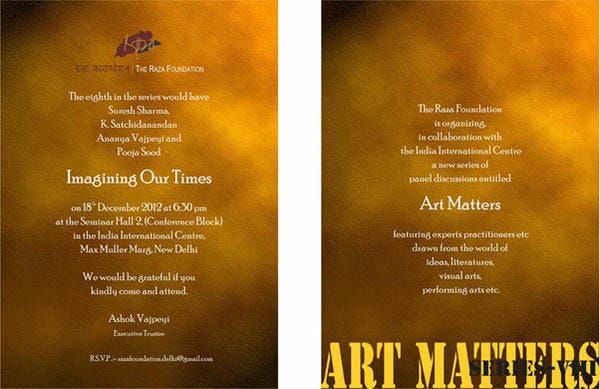
11-Dec-2012 12:00 AM
2908
The contemporary times stand witness to a constant deterioration of meaning of art and manipulation of theoretical social and political concepts as well as their practical significance. Whether they are questions as serious as social and political concerns of human rights or social exclusion affecting a dignified human survival, or as sensitive as the waning of interest in classical art forms, they call for an urgent need to revisit and discuss the prevalent conceptions.
Art has its unique way of reviving our soul from deadening monotonous routines through its multiple intricate expressions. Forming a singular perception of art or attributing a definitive meaning to it often reduces art from its fascinating complexity and expressive charm. This reductive approach confines art to its modernist understanding, which then fails to take cognizance of the artistic abstraction expressed through different forms and styles.
The Raza Foundation through its series ‘Art Matters’ provides a platform for open discussion on such issues. It endeavors not only to release the true essence of art from the clutches of definitive modernist approach in order to grasp myriad ways of extolling art, but also to stir up debate on the changing meanings of social and political theoretical concepts like rights, justice, liberty, citizenship, etc. Well known, renowned scholars and practitioners from all the diverse fields of arts, dance, music, social science, poetry, and so on are invited for this purpose.
Here, we publish the eighth panel discussion of ‘Art Matters’, titled ‘Imaging Our Times’ featuring Suresh Sharma, K. Satchidanandan, Ananya Vajpeyi and Pooja Sood.
Satchidanandan is a major Indian poet, who writes in Malayalam and English. He is also a critic, editor and translator. He was the Executive Head of the Kendra Sahitya Akademi and editor of Indian Literature, the bimonthly journal of the Akademi. He has translated the poems of Bertolt Brecht, Garcia Lorca, Pablo Neruda and Cesar Vallejo into Malayalam.
Ananya Vajpeyi works at the intersection of intellectual history, political theory and critical philology. She is currently working on three different projects: a history of caste categories in Western India from pre-colonial to modern times, a short political biography of Sanskrit, and her long-term research on the life of Dr. B.R. Ambedkar (1891-1956). Her first book Righteous Republic: The Political Foundations of Modern India was named book of the year 2012 by the Guardian and the New Republic. It received the 41st Thomas J. Wilson Memorial Prize from Harvard University Press, the Tata First Book Award for Non-Fiction (2013), and the Crossword Award for Non-Fiction (2013). Vajpeyi was educated at Lady Shri Ram College for Women (BA), Jawaharlal Nehru University (MA), the University of Oxford as a Rhodes Scholar (MPhil), and the University of Chicago (PhD).
The event was organised at the Indian International Centre on 18th of December 2012.